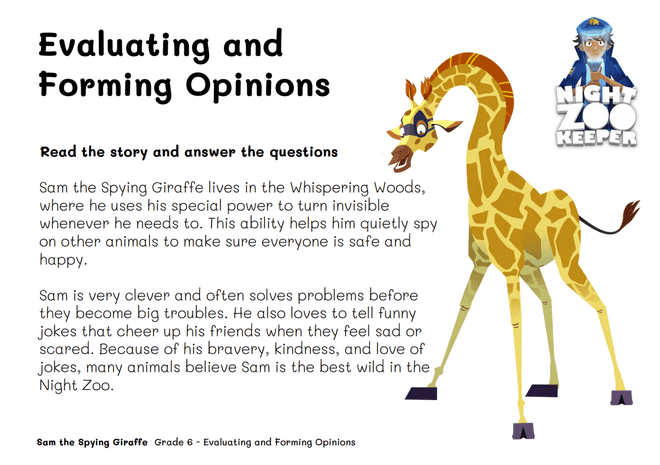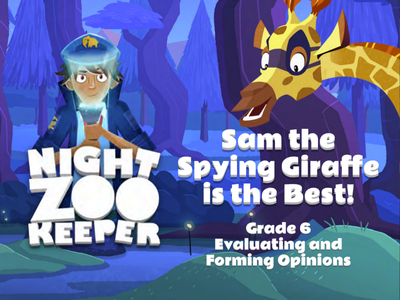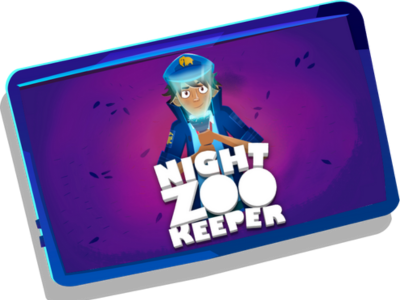Grade 6 Reading Comprehension Worksheet

Home > Resources & Worksheets > Reading Comprehension > Grade 6
Grade 6 is an exciting and challenging year where students move beyond understanding what they read to analyzing how and why an author writes. At this level, children begin to evaluate texts critically, form their own opinions, and back them up with evidence. These skills help prepare them for middle school and beyond, where independent thinking and persuasive reasoning become essential.
Typical reading comprehension skills covered in Grade 6 include:
Evaluating Texts - Analyzing the author’s purpose, tone, and techniques
Forming Opinions - Expressing personal viewpoints about a text with supporting evidence
Comparing Texts - Identifying similarities and differences in themes, structure, and style
Recognizing Bias and Perspective - Understanding how an author’s viewpoint influences the message
Supporting Arguments with Evidence - Quoting or paraphrasing from the text to justify opinions
One of the key comprehension skills Grade 6 students learn is evaluating and forming opinions. This skill helps children think critically about what they read by analyzing an author’s ideas, tone, and purpose. They learn to form their own viewpoints based on evidence from the text and to explain or defend those opinions clearly. For young readers, mastering this skill builds confidence, independence, and prepares them for analytical writing and discussion in middle school.
How to evaluate and form opinions
Evaluating and forming opinions is useful in these situations:
Assessing whether an author’s argument is convincing
Identifying bias or point of view in a text
Deciding whether you agree or disagree with a character’s choices or author’s message
Supporting personal opinions with facts, examples, or quotes from the text
Using evaluation and opinion skills effectively becomes a natural part of the reading process with practice. Let’s look at some examples:
- Evaluating an author’s argument:
After reading an article about recycling → Decide whether the author used strong evidence to support their message.
- Forming an opinion about a character:
In a story where a character keeps a secret → Discuss whether their decision was right or wrong and explain why.
- Identifying bias or perspective:
Compare two articles about the same event → Notice differences in tone or how facts are presented to form your own viewpoint.
Evaluating and forming opinions helps children become thoughtful, informed readers who don’t just absorb information - they question it, analyze it, and form their own conclusions. These skills are essential for developing critical thinking and preparing for more advanced academic reading and writing.
Tips for parents
- Ask open-ended questions like “Do you agree with the author?” to spark deeper thinking.
- Encourage your child to back up their opinions with evidence from the text.
- Read two texts on the same topic and discuss which is more convincing and why.
- Talk about real-world examples like ads or news stories to practice evaluating messages.
- Share your own opinions and explain your reasoning to model critical thinking.
Grade 6 Reading Comprehension worksheet
You can practice evaluating and forming opinions with your child by downloading this fun activity pack:

How Night Zookeeper can help

Night Zookeeper uses gamified learning to make reading & writing fantastically fun for children aged 6 to 12!
Our reading & writing program for kids can be used for homeschooling, or as a supplemental learning resource. There are thousands of award-winning activities available, including word games, reading comprehension challenges, interactive lessons, and practice worksheets for your child to fill in and learn.
Sign up today to get a 7-day FREE trial!
More resources
- Grade 6 Grammar
- Grade 6 Spelling Words
- Grade 6 Writing Activities
- Grade 6 Writing Prompts
- Reading Comprehension (overview)
Related Content


Make Reading & Writing Fantastically Fun!
- Award-winning reading & writing program for kids
- Improves spelling, grammar, punctuation & vocabulary
- Over 1,000 different learning games and activities



